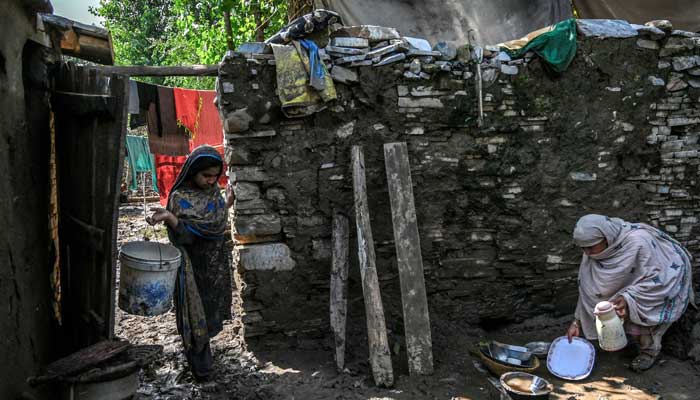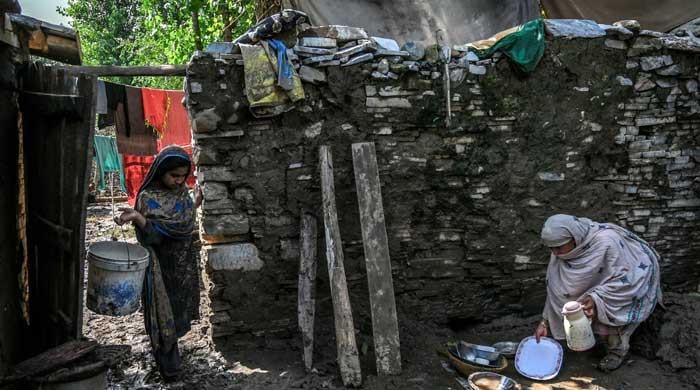
“I am scared,” Saima, a 20-year-old university student, messaged me. “The bus I was travelling on broke down on the flooded road between Nazimabad and Teen Hatti. We had to get off and find our way home. We had no option but to wade in the almost knee-deep water.”
“We were scared, as in some places the water was waist-deep for men, and we are both hardly 5 feet. As women, we cannot ask for help from anyone. I don’t know how we got home.”
Saima said they did not dare ask anyone for help, and for obvious reasons. Many families passed in high vehicles, offering to give them a lift, but they chose to wade through water and face other threats rather than seek help.
Fortunately, Saima and her friend Sughra reached home despite the difficulties, even though it took a long time.
Thousands of women across Karachi faced similar issues as different parts of the city received around 145 millimetres of rain from 8am on the morning of August 19.
People got stuck in offices, schools, markets, and elsewhere due to the heavy rain that wreaked havoc, making commuting extremely difficult.
Like thousands of other drivers, women drivers, and bikers faced problems, as some left their vehicles that either broke down or got stuck in water.
Shama, a teacher, had to leave her car almost in the middle of the road. “I was forced to turn off Sharae Faisal. People were banging on my window to warn me. I knew they were trying to help, but I was afraid of the ‘attention.’ Some people tried to push my car near the curb, but only managed to shift it a bit to the side.”
“Although I was afraid of getting out of the car, an older gentleman came and told me to come out, saying it was dangerous to keep sitting in a submerged car. He said, ‘Grab on to my arm, and I will pull you out.’ I was reluctant, but then a couple came wading through, and the older man told the woman to hold my hand. She held her husband’s hand, and they helped me through to safer ground.”
Many young girls, probably school or college students, made their way through the flooding water holding each other by the shoulder or holding hands, walking in formation. They had formulated a plan to deal with the situation, which showed they could tackle it.
However, sometimes, as Shama added, she knew the older gentleman was trying to help her, but she said that since a very young age, girls and boys are generally segregated based on religious, cultural, and social norms. However, Shama realised that at extraordinary times like floods, natural disasters, or accidents, we should make it normal for women and girls to allow rescue personnel (mostly men) to save them.
Other issues that women faced while commuting in the heavy rain were fear for their personal safety, as well as that of their loved ones. Fatima, a 25-year-old married woman, was travelling with her husband in their low Japanese car. Soon, this car was unable to tackle the flooding water washing over the roads.
“This car is not made for Karachi roads; it comes from a city that is well planned and does not have to deal with a foot or more of water,” Fatima said. “However, I was more scared about the safety of my husband as our car broke down on a street. I was afraid of street criminals taking advantage of the situation and our vulnerability. I was too scared to take out my phone to talk to family.”
Based on the past, Fatima probably had good reason to be afraid, as the media often reports on active street criminals in severe traffic jams.
She added that she didn’t dare to walk like many others did because she has lived a sheltered life and felt vulnerable outside the vehicle.
“I realised women like me are so sheltered we don’t know how to ‘survive’ on the road in normal times. I am one of the many women who say they don’t know how to cross the road. I am sure I wouldn’t be able to navigate myself on a flooded road, with my ‘designer phone and handbag.’ I’d be a target.”
The most important thing is to train women on what to do in such situations. Also, it is vital to educate society about the important role rescue personnel play during extraordinary situations like floods and heavy rains. They are trained to work under dangerous circumstances, but cannot do their job if the people they are trying to save are not ready to be rescued due to social or cultural restraints. The government needs to run awareness campaigns so that people know that the rescue personnel are trained to save their lives.
On the other hand, the rescue teams should be trained on how to do their job while understanding the cultural and social sensitivities. They should be trained about harassment and sexual harassment in the workplace, and that there are serious consequences in the event of breaching anyone’s trust.



